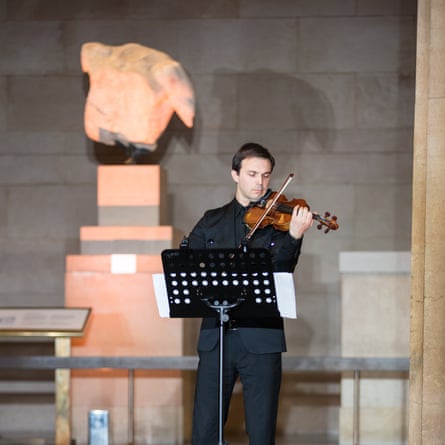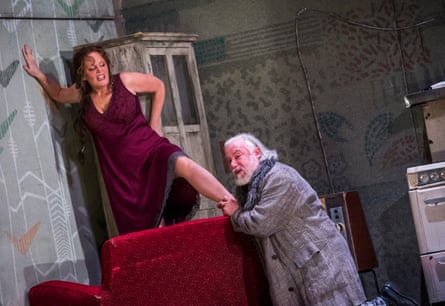In the shadow of the ravaged torso of Poseidon and the bust of his antagonist, Athena, a frieze of warriors and horsemen all around rampant in marble, the London Sinfonietta performed Richard Strauss’s Metamorphosen (1945) in its original string septet version. For the British Museum to open its inaugural music festival, Europe and the World, with this piece, played in the gallery that hosts its greatest, most discussed treasure, the Parthenon sculptures, was a master stroke.
Strauss’s haunting, impassioned late work was written in elegy to the opera houses, Vienna and Dresden among them, razed by allied bombing in the second world war. In the years he was composing it, the “Elgin marbles” were buried in a disused tunnel in London’s underground to protect them from German air raids. The mutualities of war and art and civilisation could not be more tightly knotted.
The British Museum has subtitled its two-week series “a symphony of cultures”, which it is: curated by Daniel Kühnel, intendant of Hamburg Symphony Orchestra, it features Spanish flamenco, Japanese spiritual music and traditional Chinese kunqu opera alongside Ligeti, Cage and Stockhausen. Most concerts in galleries are important chiefly as a way of cross-fertilising one art form with another, more novelty than major musical statement. The BM series, instead – following similar projects in museums in Jerusalem and Dresden – has visionary ambition and flair, its style of programming unlike any existing UK festival.

The first evening was conceived as a whole, one piece running into another, without interval. As chairs and music stands were still being cleared after the Strauss, with witty theatrical haste, as soon became clear, the thrilling tones of mezzo-soprano Susan Bickley burst forth at the start of Recital I for Cathy (1972) by Berio, written for his ex-wife, Cathy Berberian. Bickley demonstrated astonishing mimetic range, and memory, in a part as long and wordy as any of the largest operatic roles. A singer-actress plays the part of a singer giving a recital, with all the histrionics and musical variety that might call for. The pianist hasn’t turned up, there are noises off – the sound of 17 musicians making merry havoc, mostly out of sight.
Berio’s humour is theatrical as well as aural. He forges some four dozen musical fragments together, ranging with quicksilver speed from a Monteverdi lament to Rossini to Wagner to Bernstein, sometimes a mere flicker of a quotation. Bickley sailed through with wit and aplomb, the reverberant acoustic adding epic vocal bloom, with John Constable her game pianist, sharply directed by Lucy Bradley and conducted by Geoffrey Paterson. Finally, Giacinto Scelsi’s Xnoybis for solo violin (the flawless Diego Tosi), an intense, microtonal, whispering masterpiece, made the fitting conclusion.

Scelsi (1905-88), a pupil of Schoenberg, friend of Virginia Woolf, mystic and ace ballroom dancer, was central to the second British Museum concert, on Tuesday night, a piano recital by the American 20th-century specialist Jay Gottlieb. The focus was spirituality, the venue the Hotung gallery of South Asian and Chinese cultures. Scelsi’s Four Illustrations on the Metamorphosis of Vishnu, growing from its opening chords in static meditation, seemed to have found its rightful home among the Buddhas and dancing Shivas. Works by George Crumb, Maurice Ohana and Messiaen, with some slightly extraneous Liszt, completed this thoughtful programme. The curiosity was The Temple Is Measured, the Spirit Is Incarnate by the underappreciated Russian Nikolai Obukhov (1892-1954). It sounded like Messiaen – nearly half a century early.
In an all-round top week, Shostakovich’s Lady Macbeth of Mtsensk was revived at the Royal Opera House in Richard Jones’s 2004 production, conducted with explosive energy by Antonio Pappano. Eva-Maria Westbroek, as Katerina Ismailova, conveyed every ounce of her character’s boredom, sexual hunger and destructive self-obsession. John Tomlinson, celebrating 40 years of performing with the Royal Opera, returned as her revolting father-in-law, Boris Ismailov: a mesmerising spectacle. Brandon Jovanovich as sordid, deluded Sergey, John Daszak as the cuckolded, soon to be headless husband, and a sterling ensemble cast, chorus and outstanding orchestra (with excellent onstage brass band) make this an unmissable production. Last chances are on Tuesday and Friday.

Shostakovich’s Symphony No 9 is the latest, and possibly the hardest, in Aurora orchestra’s brave annual Proms tradition of playing a score from memory. It’s a highlight of the 2018 season, announced last week: 90 concerts in 58 days with 42 premieres, including commissions from Anna Meredith on first night and Roxanna Panufnik on last. The Berlin Philharmonic with its new music director, Kirill Petrenko; Andris Nelsons and the Boston Symphony; Daniel Barenboim, Yuja Wang and, with more late-night Bach, András Schiff are among bill-topping names.
Centenaries account for some of the most mouth-watering offerings: Debussy’s Pelléas et Mélisande; works by Lili Boulanger; and a generous splash of Bernstein: Antonio Pappano conducting the Orchestra of the Academy of Santa Cecilia, Rome, in a programme that includes Bernstein’s Symphony No 1, and the John Wilson Orchestra in West Side Story. Stand by for mambo-ing in the aisles.
Star ratings (out of 5)
Europe and the World ★★★★★
Lady Macbeth of Mtsensk ★★★★★

Comments (…)
Sign in or create your Guardian account to join the discussion